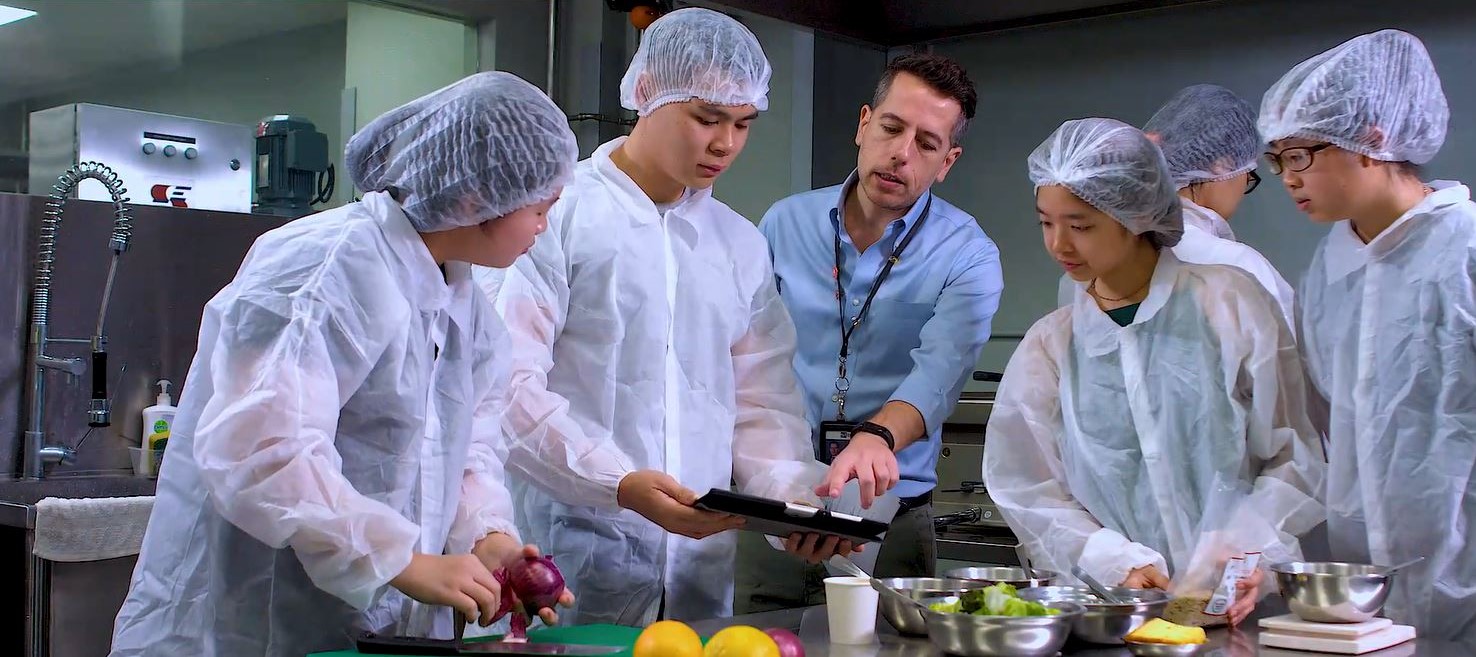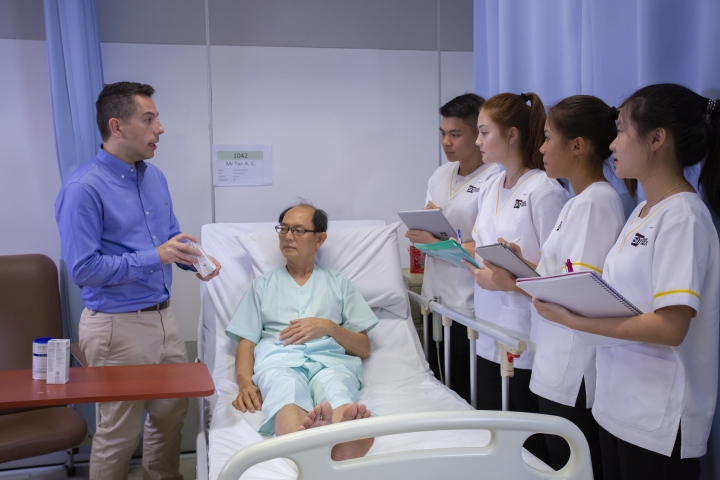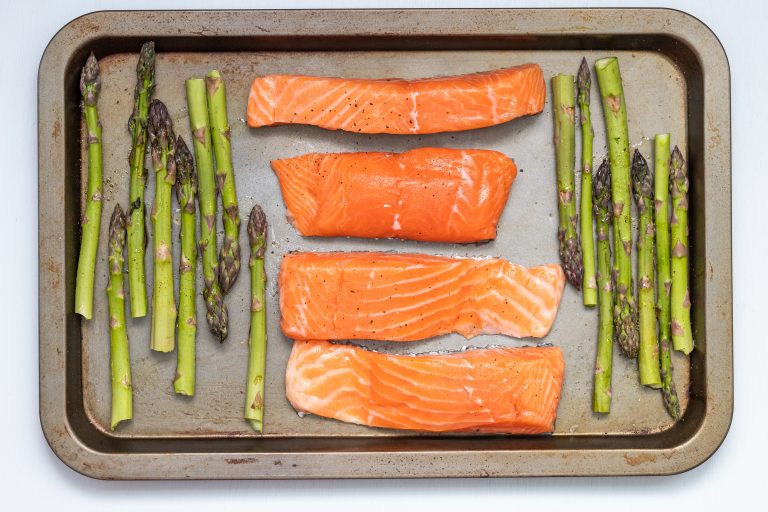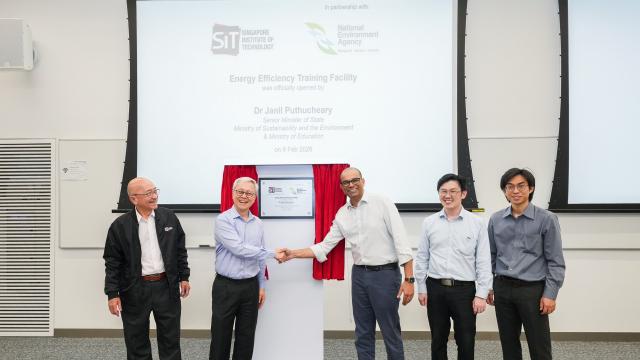How much do you know about the field of dietetics?
If you’ve found it to be shrouded in mystery, we’re here to help! We asked registered dietitian, Dr Dimitrios Spanos, if he could shine a light on the profession—and give us some advice on how to eat well. Here’s what he had to say!

Dr Dimitrios Spanos (third from left) with his students. In SIT’s Bachelor of Science in Dietetics and Nutrition, students spend time in the food lab learning about food chemistry and preparation.
1. Hi, Dr Spanos! Could you introduce yourself to our readers?
I am the Programme Director for Singapore Institute of Technology’s (SIT) degree programme in Dietetics and Nutrition. I graduated from Glasgow Caledonian University with a BSc (Hons) in Human Nutrition and Clinical Dietetics in 2006. I completed an MSc degree in Human Nutrition with specialisation in Public Health in 2007, and I obtained a PhD in 2013 from the University of Glasgow. In addition to completing and publishing research in the area of weight management and intellectual disabilities, I have worked as a dietitian for diabetes, obesity and bariatric services in United Kingdom’s National Health Service and in Cleveland Clinic Abu Dhabi.
2. How did you get interested in the field of dietetics?
Dietetics has always been a cutting-edge field that combines elements from different scientific disciplines. As a young adult, I admired people that provided care for others. I also loved studying chemistry and biology, and of course I had a passion for food! It was, therefore, a natural choice for me to study dietetics and become a health care professional that can motivate people to make lifestyle changes, and improve their health using nutrition as a method of treatment. I am happy that I chose a profession that allowed me to work in so many different fields such as public health, clinical, research, teaching and management.
3. How does a typical day for you look like? Is it very different compared to when you first started?
My current role entails designing the Dietetics and Nutrition curriculum and overseeing the successful implementation of the programme, from outreach and admissions to the smooth running of lessons and clinical attachments. I also manage the university’s close connections with industry partners from Singapore’s healthcare industry.
These duties are very much different from the ones I had when I first started! As a dietitian working in a hospital, I began my day by looking at the list of patients that have been newly referred to our services and the list of patients that I had planned to follow up for re-assessment. I prioritised my patients for the day based on each clinical case and risk of malnutrition. I then began patient nutrition assessments by looking at the medical records, talking to the nurses, doctors and of course the patients. I always finished my nutrition care by documenting and communicating my treatment plans to the care team and patients.
As a manager of dietetic services, my day commenced with a team huddle to ensure all dietitians had the support they needed with their patient list. If I had an outpatient clinic, I would prepare myself by looking at the medical records and collecting all the relevant information for the nutrition assessment of my patients.
4. What do you love about your profession? Do you have any particularly memorable experiences to share?
Nutrition has been a hot topic of discussion for years. It is at the centre of social changes regarding sustainability, food security, health and environmental policymaking, especially in the 21st century. This means that making informed and conscious food choices go beyond an individual’s lifestyle, to play an important and critical role in the quality of life and health of everyone.
It’s always a memorable moment when I’m able to motivate others towards pursuing a healthier lifestyle, and in turn, reduce their risks of debilitating illnesses like diabetes and heart diseases. At present, I do a similar thing with my students by motivating them to become excellent dietitians—and eventually changing the lives of others too.
5. Are there any misconceptions people have about dietitians that you’d like to correct?
I think one misconception is that dietitians and nutritionists are the same professions. Dietitians are qualified health professionals who assess, diagnose and treat nutritional problems at an individual and the population level. They work with healthy and sick people in a variety of settings including hospitals, private practices, polyclinics, community hospitals, intermediate and long-term care organisations, nursing homes and rehabilitation centres.
As key members of the multidisciplinary healthcare team, dietitians act as consultants to other medical and allied health professionals, food industry and media on all aspects of nutrition care. They play a vital role in the collective effort in a patient’s improvement of nutritional status for a smooth and quick recovery.
Nutritionists can work in non-clinical settings such as public health, health improvement, health policy, local and national government, non-government organisations (NGOs) and in education and research. While Nutritionists are qualified to provide information about food and healthy eating, they are not qualified to provide therapeutic interventions to sick people. However, both professionals can work closely together and are equally essential to improving our health!
6. What are some of the challenges you’ve faced in your career, and how have you overcome them?
I think one common challenge all dietitians face is patients who neither feel ready nor want a lifestyle change, despite knowing that their health is at risk. In this case, it is important for the dietitian to avoid the role of an “instructor”. Contrary to most people’s fears, dietitians do not force people to make changes; they assist patients to understand the risks of a chronic condition and work together with them to finalise a plan that meets the patient’s needs.
 Dr Dimitrios Spanos with his students in a simulated ward setting.
Dr Dimitrios Spanos with his students in a simulated ward setting.
7. Let’s talk nutrition! Have you observed anything about the local Singaporean diet? How healthy or unhealthy is it?
The first thing I noticed when I moved to Singapore is that the Singaporean diet is diverse! Singapore offers a variety of cuisines that can satisfy anyone’s tastes and food preferences. There is also a wide variety of healthy foods such as fruits and vegetables, as well as fish available in big and small food markets in the community.
One issue with the dietary habits in Singapore is that most people do not cook and tend to eat food in hawker centres and restaurants. This makes it easier to lose control of how our meals are cooked and served, and the types and amounts of ingredients used in our meals—leading to consumption of bigger portions and higher intakes of salt, unhealthy fats and sugar. The Health Promotion Board (HPB) has initiated strategies to assist consumers with this issue, including the use of the HPB Healthier Options logo for places that provide meals with healthier ingredients cooked in a healthy way.
8. Why is a healthy diet so important?
A healthy diet is essential to maintain good health, prevent diseases, feel better and ensure well-being in general.
Here’s an example for illustration: cardiovascular disease, including heart disease and stroke, is the world’s leading cause of death. Cardiovascular disease claims 17.9 million lives each year[i] and accounted for 29.3% of all deaths here in 2019[ii]. This means that nearly 1 out of 3 deaths in Singapore arise from heart diseases or stroke.
A well-balanced diet can lower these numbers greatly. Research has consistently proven that other than from regular physical activity and not smoking, a heart-healthy diet that is rich in fibre, healthy fats (omega-3 fatty acids), and antioxidant vitamins but low in salt and unhealthy fats (saturated and trans fats) can reduce the risk of cardiovascular disease.
9. Do you have any tips for students on how to have a healthier diet?
Here are some quick tips to help students have a healthier diet:
- Incorporate more fibre in your diet by adding more beans and lentils into your salads, or by choosing wholegrain cereals and wholegrain bread to make your own healthy sandwiches. Or have brown rice instead of white.
- Eat at least five servings of fruits and vegetables every day. Add fruit into yoghurt or have a banana with unsalted and unsweetened peanut butter on wholegrain bread as breakfast. Eat fruits for snacks in-between meals!
- Replace unhealthy fats (fatty meat, butter, ice cream, palm and coconut oil, coconut milk and ghee) with healthier options such as fish, avocado, nuts, low-fat yoghurt and oils like sunflower, canola, and olive oil).
- Avoid trans fats such as margarine, fried foods, fast food, frozen pizza, pies, cookies, and other pastries.
- Try to have two servings of oily fish per week and one serving of white fish per week.

Omega-3 fatty acids can be found in oily fish like salmon and mackerel
10. Last but not least, do you have any advice for those interested in this field? What education should they pursue?
If you want to pursue a career in dietetics, start building up your knowledge in chemistry and biology! It would be beneficial to start thinking about the impact that food has on our health and life in general. Above all else, be passionate about food and caring for others.
—
So, there you have it: dietitians are not the ‘food police’, and anyone can approach them for tailored advice on how to eat smarter. If we’ve piqued your interest in this field and the profession, you can hear Dr Spanos share more about what he loves in SIT Discovery Series 2020 recorded webinar (from the 9th minute onwards). We’re sure that, like us, you’ll find Dr Spanos’ enthusiasm and passion infectious!
You can also check out SIT’s programme brochure for more information on what you’ll study as a dietetics undergraduate student.
—
Did you know?
- You’ll need a Bachelor’s degree qualification in dietetics at the minimum if you want to become a practising dietitian, and SIT’s Bachelor of Science with Honours in Dietetics and Nutrition can help you get there. Launched in 2019, it is currently the only degree of its kind to be offered by an autonomous university in Singapore!
- Individuals with specific health conditions have to be especially careful with their diets, which is why dietitians are so important! Dialysis patients, for instance, have to control the amount of phosphorus, potassium, and sodium in their diet, as their kidneys are unable to filter these minerals well.
- 29 September is World Heart Day. The way to someone’s heart may be their stomach, but don’t forget that the way to a healthy heart is through the stomach too! Good nutrition helps lower your risk of developing chronic diseases. It also boosts your energy levels so that you’ll be able to power through your day.Why not raise awareness about cardiovascular diseases and show your support, by using #UseHeart and #WorldHeartDay in your social media posts?
—
References:
[i] https://www.world-heart-federation.org/world-heart-day/about-whd/
[ii] https://www.myheart.org.sg/my-heart/heart-statistics/singapore-statistics/
This article first appeared on Digital Senior.















![[FA] SIT One SITizen Alumni Initiative_Web banner_1244px x 688px.jpg](/sites/default/files/2024-12/%5BFA%5D%20%20SIT%20One%20SITizen%20Alumni%20Initiative_Web%20banner_1244px%20x%20688px.jpg)


